
Why Is SEO Not Working for You? (It’s Not Dead)
SEO not working can be a major roadblock for any business. It can leave entrepreneurs scratching their heads, feeling frustrated, and unsure of what to do next.
But here’s what you need to know: SEO is an ever-evolving strategy that needs constant attention and regular updates. It’s not a one-time setup-and-forget deal.
If your SEO isn’t working, you might be falling into some common traps or using outdated strategies that don’t work anymore.
In this guide, we’ll break down the basics and help you navigate the ins-and-outs of climbing the search engine ranks.
Quick Takeaways
- Master SEO by understanding search engine algorithms, playing the keyword game right, and creating a user-friendly website experience.
- According to 49% of marketers, organic search has the best ROI of any marketing channel.
- Find relevant keywords, hunt for fresh content opportunities, and consistently publish high quality content to keep users engaged.
- Keep an eye on competitors’ strategies (keywords, content quality, link building tactics and UX design) to create a unique yet relevant approach for better SERP rankings.
Decoding the Basics of SEO
SEO, or Search Engine Optimization, can seem like a daunting task, but it’s not as complicated as you might think. By understanding its fundamentals, you can enhance your website’s visibility and improve your search engine rankings.
Every successful SEO strategy starts with learning how search engines work. These platforms use complex algorithms that consider over 200 factors when deciding which content ranks on SERPs.
Digging Deeper into Search Engines’ Role
A deep understanding of search engines, like Google and Bing, can make all the difference when it comes to boosting your site’s presence. Their main job is to deliver relevant results based on user queries, and they account for 70.6% of all website traffic.
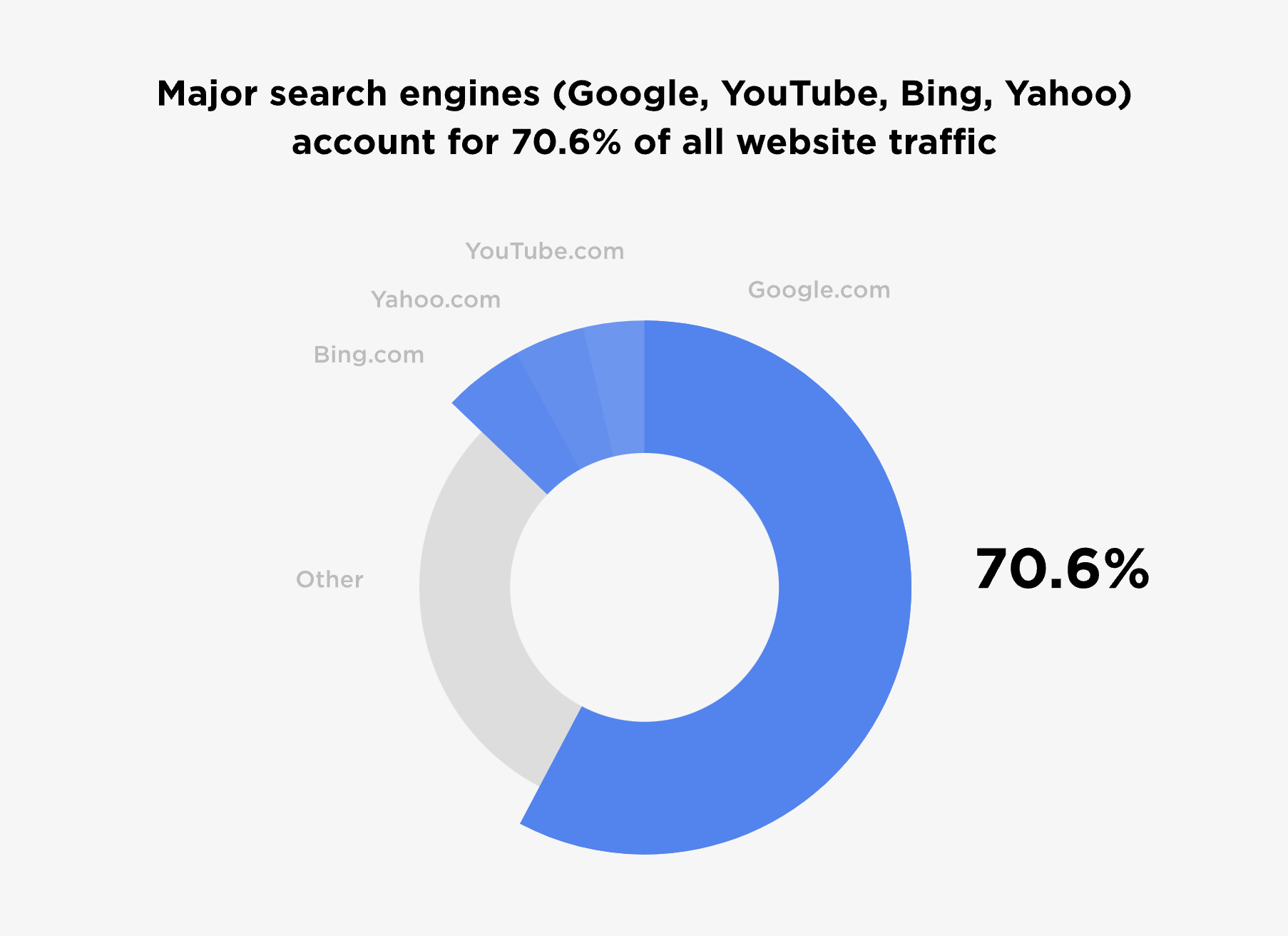
Image Source: Backlinko
By optimizing your website according to search engine preferences, you increase your chances of securing a top spot for your content in organic search results–which has the best ROI of any marketing channel, according to 49% of marketers.
The Keyword Game
In the grand scheme of an effective SEO campaign, keywords are pivotal players. They’re essentially what users type into search engines while looking for information or products similar to yours.
Picking out relevant keywords boosts your likelihood of making an appearance at the top of organic searches. But, striking a balance between relevance (how closely matched a keyword is with user inquiries) and competitiveness (the sheer volume of other sites also fighting for said term) is the secret to success.
But don’t worry–there are lots of ways, like using keyword tools or working with a content marketing agency, to easily pinpoint keyword opportunities waiting to be seized.
User Experience: The Unsung Hero
Recently, we’ve seen even more emphasis put on the User Experience (UX) in Google’s latest algorithm update, highlighting the impact of things like:
- Content quality
- Page load speed
- Mobile-friendliness
- Easy navigation
- Freshness and consistency of content
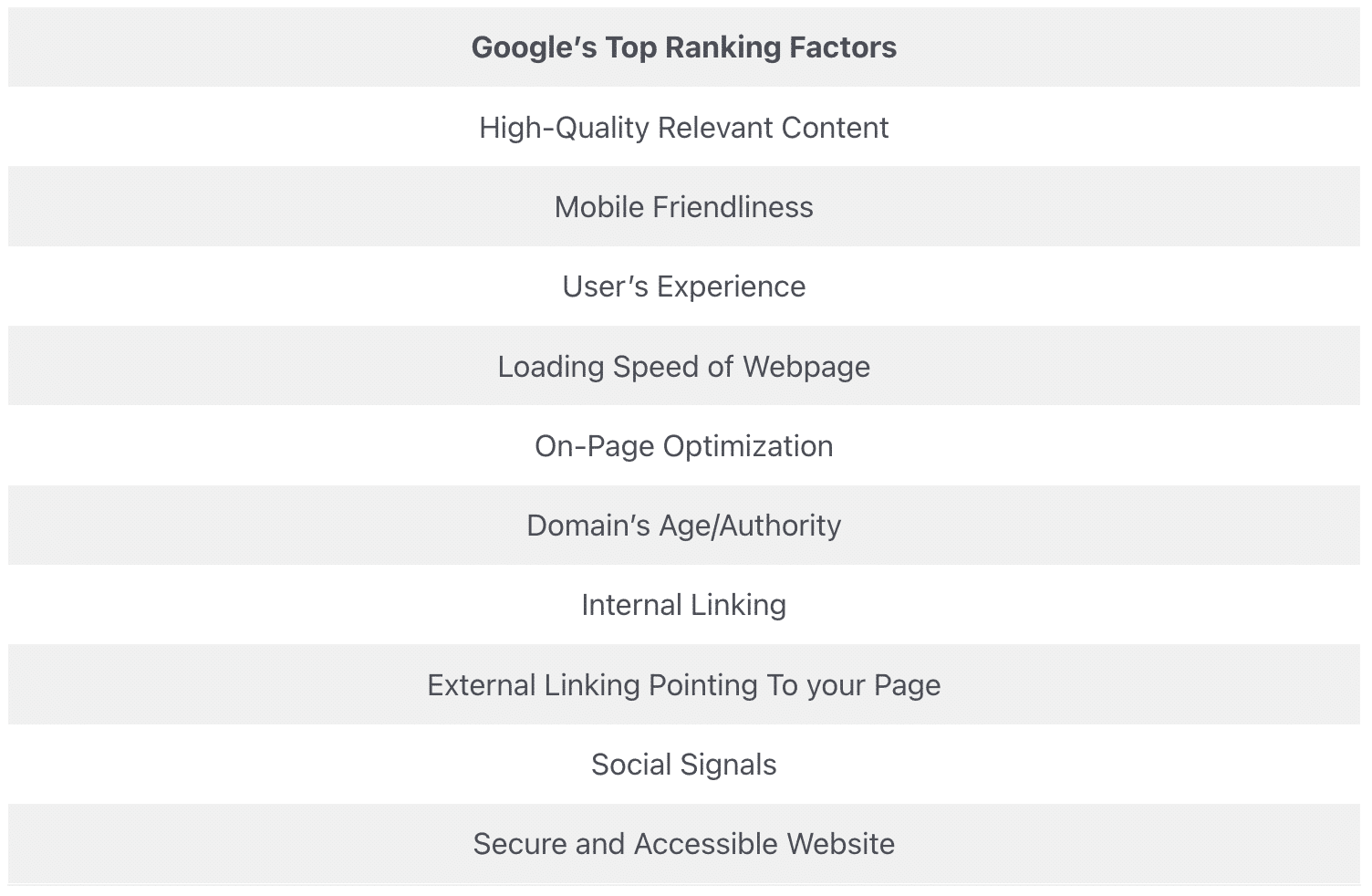
Image Source: Demand Sage
Each of these characteristics contribute to a positive UX and can greatly influence your rankings. This means that while concentrating on technical details and link profile optimization is important, your main focus needs to be on delivering an experience that your audience loves.
Analyze Your Website Structure
Your website’s structure is a fundamental part of SEO. It can either help or hurt your site’s search results, ultimately impacting the effectiveness of search marketing efforts.
Pinning Down Structural Problems
Pinpointing any structural issues on your website is key to creating a successful SEO strategy. Digital tools, like Google Search Console, can help spot these problems and perfect your SEO working strategy.
Navigating User Experience (UX)
In order for search engines to rank your content, they first need to understand its relevance and value. A well-organized site with clear navigation menus can not only help the user experience, but also Google indexing by providing a straightforward path throughout each webpage.
Sitemaps: Necessity Not Luxury
Sitemaps help search engines during indexing processes, acting as ‘directional cues’ around brand-specific content. If starting one seems overwhelming, there are plenty of online guides that can help you get started.
Identify Keywords and Content Opportunities
In the world of SEO, understanding your audience’s language is non-negotiable. This means you need to identify relevant keywords they use when searching for products or services similar to yours.
Using tools like Google Keyword Planner can be extremely helpful by offering insights into:
- Keyword popularity
- Competition levels
- Related terms to enrich your content
Finding New Avenues for Content
Beyond finding keywords, it’s just as important to find opportunities for fresh content. The goal isn’t to just attract users, but also to ensure they stay engaged with your high-quality content.
This means analyzing FAQs about your industry or product, which you can then address through relevant articles or blog posts. Remember: Engaging material encourages repeat visits!
Dodge Duplicate Content Pitfalls
Duplicate content can negatively impact your website’s search engine ranking since Google’s algorithm favors unique information over copied text. To keep things original, strive for uniqueness in every piece of content published on your platform.
If identical information appears across multiple URLs (like product descriptions), think about using canonical tags or 301 redirects–tools that inform search engines where the ‘original’ version lives. This helps avoid diluting link equity among several pages while keeping the main focus on one authoritative page per topic.
Keep Your Content Consistent
Your SEO strategy should prioritize consistent publishing of quality content. This tells search engines that not only is your site active, but it’s also committed to offering value to visitors.
Creating a content calendar can help ensure regular posts without compromising their quality. When you’re improving your website’s SEO strategy, remember: Quality always beats quantity. Make sure each post counts towards enhancing user experience as well as boosting organic traffic from search results.
Monitor Your Competitors’ Strategies: The Key to SEO Success
Staying ahead of your competition’s tactics is essential for SEO success. Keeping tabs on your rivals’ activities and adjusting the SEO plan for your website can help you perfect your own strategy.
The Art of Keyword Spying
The first step is to identify which keywords are driving traffic to competitor sites. According to Databox, most businesses target keywords to rank in the top 3/10/20/100 spots.
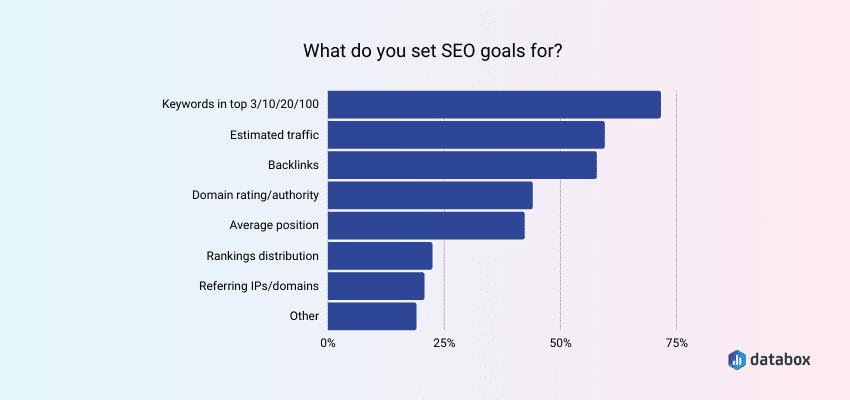
Image Source: DataBox
As a result, you might stumble upon keyword opportunities that you’ve missed so far. Just keep in mind that it’s not about mimicking your competitors’ efforts, but rather finding ways to set yourself apart while still remaining relevant in SERPs.
A Deep Dive Into Content Quality
Your rivals’ content quality plays a key role in their ranking on Google’s algorithm-driven SERPs. By taking a close look at their content, you can find elements that resonate with both users and search engines alike.
As you work through this process, be sure to aim for superior content creation that offers real value. SERPs aren’t fond of copied, poorly-written material.
Sleuthing Link Building Tactics
Beyond quality content lies another key component of any successful site’s search results: Link building strategies that secure backlinks from authoritative websites, ultimately enhancing the brand’s credibility.
To uncover who links back to your competitors, you can use tools like Moz Link Explorer. This can lead to potential partnerships where your brand’s contents may be promoted too.
Gauging Site Structure And User Experience
You can also learn a lot about your rivals’ site by evaluating their user experience and examining their navigation.
Are their menus intuitive? Is there an effective internal linking system?
If your competitors aren’t quite hitting the mark in these areas, consider it an opportunity to improve your own UX design. Just remember, the ultimate goal of monitoring competitor strategies is to create unique, quality experiences tailored to your specific audience.
Technical SEO Tactics: The Key to Better Search Engine Rankings
For optimal search engine rankings, technical SEO tactics are essential for optimizing your website. The organization of your content and its performance have a pretty big impact on how well you place in Google’s formula.
In addition to perfecting classic SEO elements, like headlines, title tags, URLs, and meta descriptions, here’s what else you need to know to optimize your content:
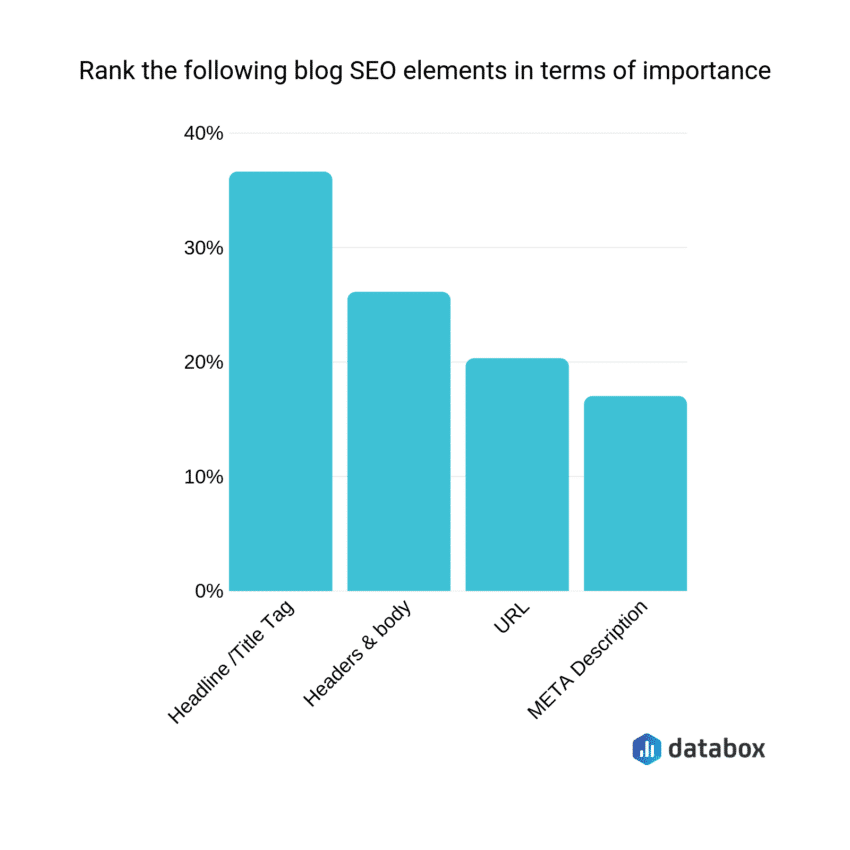
Image Source: DataBox
The Impact of Page Speed Optimization
A slow-loading page is like a closed door for users–they won’t wait around. Google considers page speed as an important ranking factor, meaning slower pages can potentially hurt your position in the SERPs.
- To enhance load times, compress images before uploading them or use caching plugins.
- You might also consider minifying CSS and JavaScript files on your website, which will also help reduce loading time.
Leveraging Image Optimization Techniques
Beyond reducing file size, you can optimize your images by adding relevant alt-text descriptions with each image. This helps search engines understand what the picture represents.
Image optimization techniques also include:
- Adding descriptive file names instead of generic ones like “IMG1234.jpg”. These make both users’ browsing experience better and provide context for search engine bots.
- Create alt-texts that accurately describe what’s shown in every image across all web pages within the domain.
- Incorporate proper formatting when dealing with multiple URLs linking back to the same resource.
Unlocking the Power of Link Building Strategies
When done correctly, link building has major potential to boost your website’s search engine ranking.
Prioritizing Quality over Quantity in Links
When it comes to SEO, more doesn’t always mean better. Google’s algorithm prefers high-quality links from authoritative websites relevant to your brand’s content, rather than just sheer volume.
Cultivating Backlinks through Content Creation
Creating valuable and engaging content is a key component of successful link building. When you produce high-quality content that resonates with your target audience, it increases the likelihood of other websites linking back to your site. In fact, businesses with blogs receive 97% more backlinks to their website.
Building Relationships for Link Opportunities
Networking and building relationships with other website owners and influencers in your industry can open doors to valuable link opportunities. By making connections and providing value to others, you increase the chances of them linking to your website.
Avoiding Black Hat Link Building Tactics
While it may be tempting to take shortcuts, using black hat link building tactics can have some serious consequences for your website’s SEO. These tactics, like buying links or participating in link schemes, can hurt your rankings more than they’ll help them.
Optimizing Anchor Text for Relevance
When adding links into your content, it’s essential to use anchor text that’s relevant to the linked page. This helps search engines understand the context of the link and improves the overall user experience.
Monitoring and Analyzing Your Link Profile
Regularly monitoring and analyzing your link profile is crucial for identifying any potential issues or opportunities. Tools like Google Search Console and specialized SEO software can help point out useful information about the quality of your links.
Measure Your Results
As with any great marketing strategy, monitoring and measuring your results is crucial. Using analytics tools like Google Analytics allows you to gauge how well your website’s SEO strategy is performing in search engine rankings.
Here’s a short video on how Google Analytics can help you better understand the efficiency of your marketing efforts:
Video Source: GoDaddy
1. Tracking Organic Search Traffic
When you’re assessing an SEO campaign, the first thing you should review is organic search traffic. This metric shows the number of visitors who land on your site via unpaid (organic) listings from search engines rather than through paid ads or direct entries.
2. Assessing Keyword Rankings
Beyond traffic data, evaluating keyword rankings is also a crucial part of any business-based online marketing makeup. Keywords directly influence which sites appear first under Google’s algorithmic-driven SERPs.
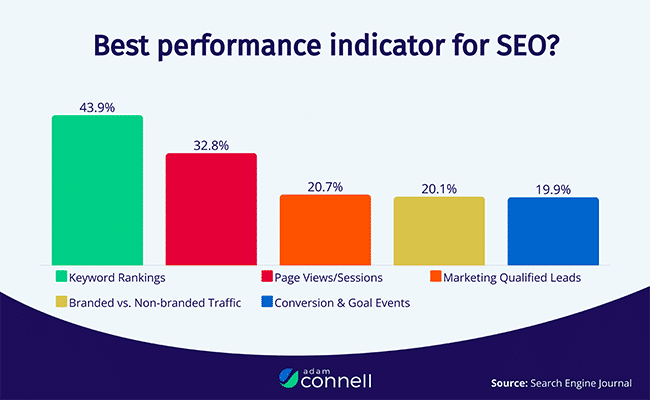
Image Source: Adam Connell
Tools like SEMrush offer features that allow you to track keyword positions over time across multiple URLs. This can highlight key information about ranking shifts for specific keywords tied with your brand content influencing visibility on SERPs.
3. Reviewing Backlink Profile
The strength of backlinks to your website significantly influences where it will rank among other domains.
Ahrefs’ Backlink Checker tool helps determine not only the quantity, but also the quality and relevance of domain links pointing towards yours.
Remember, consistent analysis isn’t just about number crunching; Understanding trends over time is key too, so keep tabs regularly.
FAQs in Relation to Seo Not Working
How do I fix Google SEO?
To fix your Google SEO, first audit your site for issues. Then, optimize your brand’s content with relevant keywords and improve website speed. Also, consider implementing structured data markup.
How do you check if SEO is working or not?
You can use tools like Google Analytics or SEMrush to track metrics like organic traffic, bounce rate, and keyword rankings to determine the effectiveness of your SEO efforts.
How long does it take for your SEO to work?
SEO isn’t an overnight process; it typically takes around 4-6 months before you start seeing solid results.
Why is SEO getting harder?
The increasing complexity of search algorithms coupled with fierce competition makes achieving high SERP positions more challenging than ever before.
Master the Art of SEO Today
SEO isn’t just a one-time thing; it’s a game that keeps changing. To win, you’ve got to stay on top of search engine tricks, play the keyword game well, and make sure your website is user-friendly. When you find your own unique strategy, watch your results, and adjust as needed, you’re on your way to SEO success.
Are you ready to get more traffic to your site with quality content published consistently? Check out our SEO Blog Writing Service or schedule a quick consultation to learn more about how Marketing Insider Group can help you earn more traffic and leads for your business.






